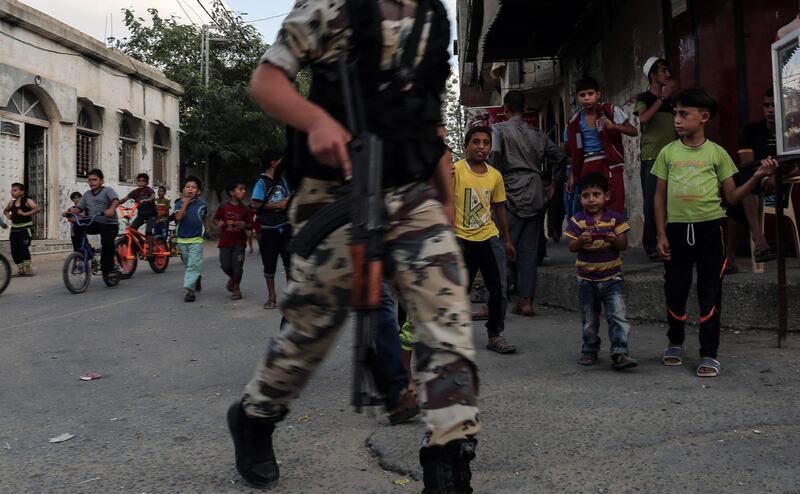Hamas said on Sunday it had dissolved its de facto government in the Gaza Strip and met other demands of Palestinian president Mahmoud Abbas to pave the way for a reconciliation with his Fatah movement which runs West Bank self-rule enclaves.
Such a rapprochement would heal a decade-old divide in Palestinian politics that has greatly set back statehood aspirations. But analysts cautioned that many complex issues would still have to be resolved and recalled that earlier reconciliation efforts had foundered, with each side unwilling to give up the monopoly of power in its territory.
In a statement issued overnight after eight days of meetings with Egyptian mediators, Hamas said it had dismantled the administrative committee it formed six months ago to rule Gaza, a move that triggered punishing sanctions by Mr Abbas aimed at toppling the Islamist movement. The sanctions included cutting off funding for Gaza's electricity, cutting salary payments and even refusing medical referrals from the Strip.
Hamas also invited Mr Abbas's government to return to Gaza, 10 years after Fatah security forces were routed in a brief civil war. And the movement said it was ready to hold new presidential and parliamentary elections, which are about a decade overdue because of the rift.
"This puts Abu Mazen and Fatah to the real test," Hamas official Fawzi Barhoum wrote on the movement's website, in what amounted to a call to lift the sanctions. "Our people is looking for a practical and actual response in order to achieve its ambitions of national unity and real partnership."
Fatah central committee member Mahmoud Al Aloul welcomed the Hamas announcement but was also cautious. "We want to see that happening on the ground before we move to the next step," he said.
Mkhaimar Abusada, a political scientist at Gaza's Al Azhar University, said: "This is a very significant moment that Hamas agreed to dissolve the administrative committee and allowed the Egyptians to get more involved."
But, "the devil is in the details and there are tons of details that need to be worked out".
He said these include determining the future of Hamas's armed wing, the Ezzedine Al Qassam brigades, and of armed resistance against Israel - things that were not mentioned in the Hamas statement. A key question that needs to be answered is who will be in charge of security?
Further points of uncertainty are the fate of the 43,000 Hamas-appointed government employees in Gaza and whether Mr Abbas will make good the cuts that he made six months ago to the salaries of employees who had worked for the government when Fatah ruled the territory. A 2014 reconciliation agreement foundered over the fate of the Hamas employees, with Fatah saying they should be sacked and Hamas insisting on their integration into the Fatah-run administration.
Yet another issue that needs to be worked out is whether the new national unity government will be formed by consensus or whether Mr Abbas will appoint it.
And looming above all these is the question of which of the two factions will decides whether to make peace or war with Israel, Mr Abusada said.
"We're not completely sure that it's going to work," he said. "Ask any Palestinian in the street and he will tell you he is not sure Fatah and Hamas are sincere in ending the divide and opening a new page in Palestinian history."
Hamas's willingness to make concessions is seen as stemming from the desperate economic conditions in Gaza and a desire to strengthen relations with Egypt and prove to Cairo that it is not the one holding up reconciliation.
"There has been a big change in their relations with Egypt and they depend on them so they responded to Egyptian demands," says Talal Awkal, Gaza-based columnist for Al Ayyam newspaper. Egypt controls the Rafah border crossing, which Hamas leaders hope will serve as Gaza's lifeline to the outside world in the face of severe controls at the Erez crossing into Israel.
Still, Awkal doubts Hamas will give up control of its security forces or its reconciliation with Mohammed Dahlan, a former Fatah leader and arch rival of Mr Abbas with whom it recently reached understandings.
"I don't think such a reconciliation will be a success," Awkal said.
In his view, Mr Abbas is unlikely to go ahead with it, preferring instead to pursue a strategy of working with the Trump administration in a bid to revive negotiations with Israel.
"He wants to do this without the heavy burden of Gaza," he said.
_______________
Read more:
[ Hamas engagement with Egypt fails to reconcile Palestinian rivals ]
[ UN chief decries 'dramatic' humanitarian crisis in Gaza ]
[ Premature babies and sick children at risk from Gaza's constant blackouts ]
[ How young Palestinians lost faith in the old men of Fatah ]
_______________





